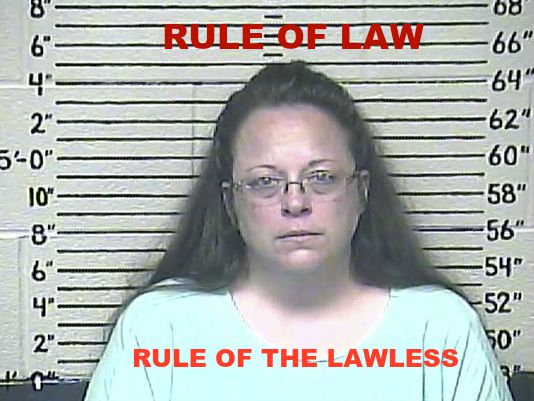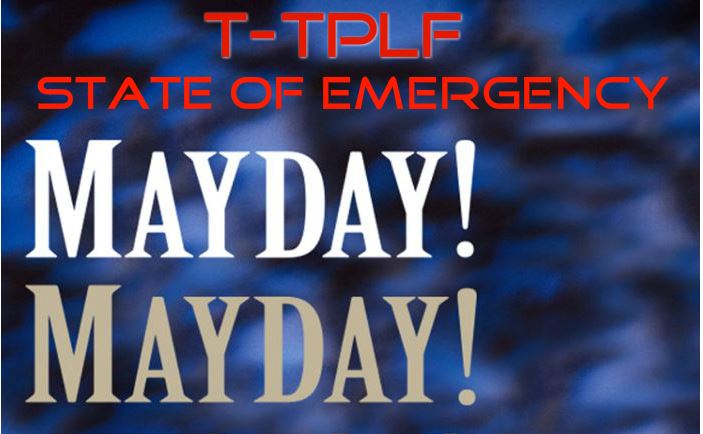Kim Davis: A Lesson in the Rule of Law
 In April 2010, Army doctor Lt. Col. Terry Lakin refused to deploy to Afghanistan because he believed President Barack Obama is not born in the United States and therefore constitutionally unfit to become U.S. President and commander-in-chief.
In April 2010, Army doctor Lt. Col. Terry Lakin refused to deploy to Afghanistan because he believed President Barack Obama is not born in the United States and therefore constitutionally unfit to become U.S. President and commander-in-chief.
Lakin was court martialed, found guilty of disobeying a lawful order, not deploying with his unit and dereliction of duty and sentenced to six months in the United States Disciplinary Barracks.
Like Lakin, Kentucky County Clerk Kim Davis refused to implement a decision of the United States Supreme Court legalizing same sex marriages because her religious beliefs prevent her from following the ruling of the highest court in the land.
The power to issue marriage licenses in Kentucky is given solely to its 120 county clerks. Davis is the first state official to challenge the ruling of the highest court in the land in the lowest federal court in the land.
Of course, Davis’ personal religious beliefs about same sex marriage, like Lakin’s personal belief in the non-citizenship of Barack Obama, can never be questioned. They are both guaranteed the absolute right to believe what they want under the free exercise clause of the First Amendment.
How Davis’ personal beliefs intrude upon the performance of her duties as an elected official can and must be questioned.
The vast majority of state officials in the U.S. with responsibility for issuing marriage license have complied with the particular Supreme Court decision as nearly all members of the armed forces accept and follow the orders of their Commander-in-Chief Barack Obama.
Davis was cited for contempt by a federal district court and briefly jailed and released for refusing to follow the law of the land.
The Family Research Council presented Davis an award for defying the federal judge.
The Vatican extended Davis an audience with Pope Francis.
But Davis was unsuccessful in enlisting the supreme powers of American law. Her application seeking exemption from compliance with the U.S. Supreme Court’s decision was summarily denied by the U.S. Supreme Court.
When Davis took office, she took the oath required under Kentucky Constitution, Section 228: “I do solemnly swear (or affirm, as the case may be) that I will support the Constitution of the United States and the Constitution of this Commonwealth…”
Col. Lakin did the same: “I, _____, do solemnly swear (or affirm) that I will support and defend the Constitution of the United States… and that I will obey the orders of the President of the United States and the orders of the officers appointed over me…” (10 USC 502).
Like Col. Lakin who invoked his personal interpretation of the U.S. Constitution, Clerk Davis invoked her religion to disregard her oath of office and the ruling of the highest court in the land. Davis declared, “To issue a marriage license which conflicts with God’s definition of marriage, with my name affixed to the certificate, would violate my conscience.”
Underlying Davis’ apparent moral outrage is an old constitutional canard about “states’ rights” or “state sovereignty”.
There are some who nurse the discredited and antiquated view that the reserved powers of the states far exceed the enumerated powers of the federal government; and therefore states are not obligated to acknowledge federal supremacy or follow federal law. In other words, they believe state law is supreme over federal law.
Davis may be offended by the very idea of same sex marriage, but her official (mis)conduct in disregarding the decision of the highest court in the land is offensive to the “highest law in the land”, the U.S. Constitution.
Davis and her lawyer may be unaware but their battle with the U.S. Supreme Court was fought tooth and nail and lost back in 1816 in a case called “Martin v. Hunter’s Lessee”.
In Martin, the Virginia State Supreme Court denied the authority of the U.S. Supreme Court in state legal matters.
The Virginia State Supreme Court had ruled that Virginia law authorizing confiscation of property of British subjects was superior to U.S. treaties with England protecting the property rights of British subjects.
The Virginia court ruled that Virginia law superseded (nullified) U.S. treaties with England protecting such property rights.
On review, the U.S. Supreme Court overruled the Virginia court and sent the case back for a proper ruling. The Virginia Supreme Court refused to comply declaring the U.S. Supreme Court did not have authority to review and decide cases originating in state court.
U.S. Supreme Court Justice Joseph Story, in establishing the principle of federal judicial supremacy, wrote that the Constitution was written by the people and not the states. He argued the states needed to yield to the Supreme Court’s decision because the people themselves have authorized the judicial powers to be given to the U.S. Supreme Court in the U.S. Constitution.
The Martin case established once and for all the appellate review authority of federal courts in state court proceedings.
Davis’ argument is essentially the same as the Virginia court in Martin: The U.S. Supreme Court does not have jurisdiction over God’s Law (as opposed to the law of the states) and therefore she is not obligated to follow the pronouncements of the highest court in the land.
It is a great honor for Davis to visit with Pope Francis.
The fact is Davis is not working for Pope Francis or the Church.
Davis works for the State of Kentucky under the umbrella of the U.S. Constitution. That Constitution is clear about the duties and obligations of all serving under state authority. “This Constitution, and the laws of the United States which shall be made in pursuance thereof… shall be the supreme law of the land; and the judges in every state shall be bound thereby, anything in the Constitution or laws of any State to the contrary notwithstanding.” (Emphasis added; Article VI.)
Davis’ battle with the U.S. Supreme Court has more recent antecedents.
In Brown v. Board of Education (1954), the Supreme Court desegregated public schools.
State officials throughout the Southern states rose up in moral outrage in much the same way as Davis today.
Southern officials had moral objections to white and black kids going to public schools together.
“The religious right, who liked to call themselves the “moral majority” at the time, actually organized around fighting to protect Christian schools from being desegregated.”
As a result of the recalcitrance of public officials and in an effort to hinder school integration, hundreds of public schools were shut down in the American South in 1958 and 1959.
A large group of Congressional members opposed to implementation of the Brown decision even issued The Southern Manifesto declaring, “The unwarranted decision of the Supreme Court in the public school cases is now bearing the fruit always produced when men substitute naked power for established law.”
Could Davis’, Lankin’s and the Southern Manifesto declarants’ moral objection override the supremacy clause of the U.S. Constitution?
On another level, taking Davis’ position at face value over her conscientious objection to selective U.S. Supreme Court rulings, does her moral decision comport with Christian teaching on separation of church and state.
I argue that the principle of separation of church and state was established millennia before it was formally incorporated in the First Amendment to the U.S. Constitution in 1791.
In Mark 12:17 (see also Luke 20:20-26; Mark 12:13-17)), Jesus answered the Pharisees who asked him whether it is “right to pay the imperial tax to Caesar or not?” (The Pharisees are described as a religious political party, a social movement, and a school of thought in the Holy Land during the time of Second Temple Judaism.)
Jesus’ response was a quick cross-examination of the Pharisees on the physical evidence.
Jesus chastised, “You hypocrites, why are you trying to trap me? Show me the coin used for paying the tax. They brought him a denarius, and he asked them, ‘Whose image is this? And whose inscription?’
‘Caesar’s,’ they replied.
Then he said to them, ‘So give back to Caesar what is Caesar’s, and to God what is God’s.’”
Whose image is on the Seal of the State of Kentucky under which Davis claims to exercise authority to grant or deny marriage licenses?
Did Davis pledge allegiance to the United States Constitution, the ultimate “Caesar of America”?
When Davis recites the Lord’s Prayer she pledges allegiance to serve the Lord.
When Davis took her oath of office, she pledged allegiance to (pre)serve and uphold the United States Constitution.
Davis took a solemn oath to obey man’s (Caesar’s) law.
Is Davis a hypocrite like the Pharisees for using her state authority not to comply with a higher federal authority in the name of complying with the highest authority of all?
Is Davis obliged by Scripture to comply with Caesar’s law when she works for Caesar and God’s law when she serves God?
Should public servants follow their consciences and the “higher law” and not the highest law in the land or the law enacted by the people’s representatives?
Does Davis, as an elected public official, have a legal and mandatory obligation to uphold the law, even if she disagreed with it?
Did Col. Lakin have a duty to follow the orders of his superiors to deploy regardless of his belief about the commander-in-chief’s citizenship?
Does Davis have the right to superimpose her religious beliefs on her official duties and implement the law as she sees morally fit?
Davis has her answer for her moral objection to complying with the legitimate order of the highest court in the land.
U.S. Supreme Court Justice Antonin Scalia, who like Davis, vigorously opposed the majority ruling legalizing same sex marriage, said the moral choice for a public official disagreeing with the law is to resign, not disregard the law.
Scalia stated bluntly that if he believed the death penalty is fundamentally immoral, he would resign:
[W]hile my views on the morality of the death penalty have nothing to do with how I vote as a judge, they have a lot to do with whether I can or should be a judge at all… [W]hen I sit on a Court that reviews and affirms capital convictions, I am part of “the machinery of death.” My vote, when joined with at least four others, is, in most cases, the last step that permits an execution to proceed. I could not take part in that process if I believed what was being done to be immoral… [I]n my view the choice for the judge who believes the death penalty to be immoral is resignation, rather than simply ignoring duly enacted, constitutional laws and sabotaging death penalty cases. He has, after all, taken an oath to apply the laws and has been given no power to supplant them with rules of his own.
I often do not agree with Scalia (see my commentary “The ‘Jiggery Pokery’ Jurisprudence of Justice Scalia”), but he is absolutely right in his views that respect of the rule of law trumps any personal objections to the law.
If Davis believes performing her official duties will force her to become part of the state’s machinery of licensing marriages, she should resign.
Mat Staver, Davis’ attorney claimed requiring Davis to comply with her official duties is like what “Nazi Germany did to the Jews. They removed the Jews from government public employment, then they stopped patronizing them in their private businesses, then they continued to stigmatize them, then they were the ‘problems,’ then they killed them.”
Former Arkansas governor and current Republican presidential hopeful declared, “You obey [the law] if it’s right.”
In other words, if you are rushing to your meeting, no need to obey the traffic and stop signs. Plough through!?
Huckabee complained of “judicial tyranny by five unelected lawyers”.
Of course, Hypocrite Huckabee did not call out the “judicial tyranny” of the U.S. Supreme Court when that Court decided 5-4 Bush v. Gore (handing the presidency to George Bush, 43), Citizens United v. FEC (unlimited political spending by independent political spending by corporations, etc. is OK) and Shelby County v. Holder (invalidating federal preclearance in voting law changes in states).
Huckabee does not believe what is good for the goose is good for the gander.
Is the choice between “judicial tyranny” and “tyranny of the self-righteous”?
The implications of Davis’ defiance are troubling. By the same token:
Can an American soldier practice his faith by refusing to engage in combat in Iraq because he does not want to kill members of his faith?
Can a corrections officer practice his/her faith by releasing a prisoner because s/he personally believes the conviction is unjust?
Can a police officer practice his/her faith by refusing to enforce the law because he believes the law is unjust to the poor and minorities?
Can a prosecutor practice his faith with a “Robin Hood mentality” and refuse to prosecute shoplifters in grocery stores because he believes poor people have a right to get what they need to survive?
Could an employer say s/he will not hire a person of color because of religious objections and reject the Civil Rights Act of 1964? Or a county clerk refuse to register a citizen of color because of a personal moral code?
Could enlisted men and officers in the U.S. armed forces refuse to follow their commander in chief because s/he is white and Christian?
Government officials are sworn to uphold the law. If they can’t perform their official duties for moral reasons, their only option is to resign. They can do whatever they please as private citizens.
What would be the effect of allowing public servants to pick and choose the laws they will follow based on their moral principle? Lawlessness? Chaos? Anarchy?
There are public officials, figures and even men of the cloth who seem to spend a lot of time on another planet and return to earth briefly to share in their wisdom.
In a 1993 sermon, the late Jerry Falwell preached, “There is no separation of church and state. Modern US Supreme Courts have raped the Constitution and raped the Christian faith and raped the churches by misinterpreting what the Founders had in mind in the First Amendment to the Constitution.”
In an earlier sermon in July 1976, Falwell said, “The idea that religion and politics don’t mix was invented by the Devil to keep Christians from running their own country.”
Republican presidential hopeful Rick Santorum said, “I don’t believe in an America where the separation of church and state are absolute. The idea that the church can have no influence or no involvement in the operation of the state is absolutely antithetical to the objectives and vision of our country…”
The “Father of the American Constitution” would disagree with all of them. James Madison said, “The purpose of separation of church and state is to keep forever from these shores the ceaseless strife that has soaked the soil of Europe with blood for centuries.
Ronald Reagan, the iconic modern conservative figure, said, “We were founded as a nation of openness to people of all beliefs. And so we must remain… We establish no religion in this country, we command no worship, we mandate no belief, nor will we ever. Church and state are, and must remain, separate… [G]overnment to be strictly neutral…”
Thomas Jefferson wrote, “Believing with you that religion is a matter which lies solely between man & his god… , I contemplate with sovereign reverence that act of the whole American people which declared that their legislature should make no law respecting an establishment of religion, or prohibiting the free exercise thereof, thus building a wall of separation between church and state.”
No one can challenge Davis personal belief or opinion on the morality of same sex marriages. I will defend Davis’ right to hold her personal beliefs and opinions to the end.
Davis has every right to petition government for a change in the law.
Davis can pursue all legal and political means to oppose same sex marriages.
Davis is free to engage in public mobilization against same sex marriage.
Davis has the unquestioned right to join the numerous religious and civic organizations that oppose same sex marriages and change the law.
Davis has an unquestioned right to advocate and mobilize for her point of view individually or through organizations.
The only question is the official (mis)conduct of elected public servant Kim Davis who pledged allegiance to the Constitution of the United States when she took office and her defiant refusal to uphold her oath. To paraphrase Justice Sacalia, Davis took “an oath to apply the laws and has been given no power to supplant them with rules of her own.”
The ultimate question is not whether an officer of the U.S. armed forces believes his commander-in-chief meets the constitutional test to become president or a county clerk believes her moral beliefs prevent her from issuing marriage licenses.
The ultimate question for all Americans is whether they choose to live under the rules of an imperfect Constitution designed to form a more perfect union or submit to the personal moral codes of county clerk Kim, Col. Terry, Tom, Dick, Jane and Harry.
When the rule of just law withers, the rule of unjust men (and occasionally women) in military uniform or clad in the mantle of state blossoms.
Justice cannot be “Just Us”.
“I pledge allegiance to the flag of the United States of America, and to the republic for which it stands, one nation under God, indivisible, with liberty and justice for all.”
** This commentary was written several weeks ago. I delayed posting it to give priority to other current issues.**







